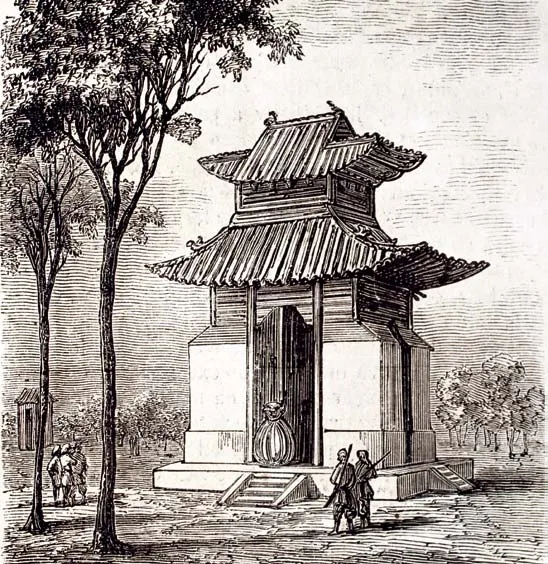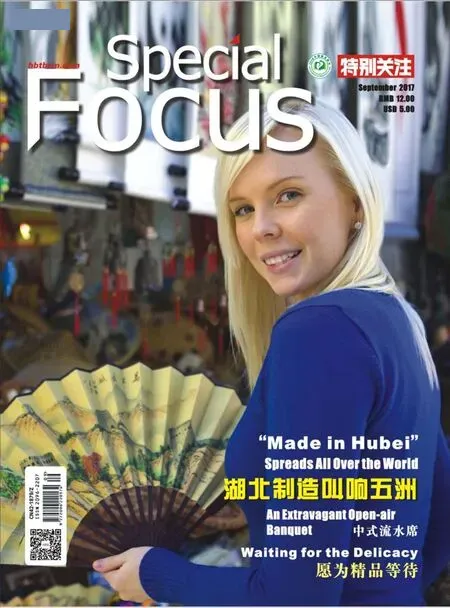Cleverness VS Wisdom
2017-10-11ByLiuYunsheng
By Liu Yunsheng
Cleverness VS Wisdom
By Liu Yunsheng
The principle that prestigious families give to their offspring to prepare them as high-rank officials normally comes in three ways:respect the law, morality, and worldly wisdom. This is the well-known three-inone “emotion, reason, and law” principle.
To speak of it, it is clear and concise, but to really put it into practice is extremely difficult. To do the right thing and avoid evil is something that most of us are able to do.To be able to maintain one’s integrity and values in a diverse and complex political atmosphere, while still taking action to do the things you need to do and preserving one and one’s family involves our senses of reason, cognitive abilities, and good judgment.
Some types of behavior are fair and just, while being completely above the law, but no matter how you look at it, it always seems to come across as somewhat improper, bordering on hypocritical and fraudulent, quite like a ‘scheming civil servant.’
During the Song dynasty, Teng Zijing built the Yueyang Tower, turning Teng Zijing into a household name. Fame,though, does not necessarily equate to a good reputation.
According to records in Sima Guang’s Records of Rumors from Sushui,Teng Zijing didn’t use any of the local government’s funds to build the Yueyang Tower, neither did he distribute the costs among the commoners. Where did the money come from? He suggested that any long unpaid debts of the commoners could be donated, instead, to the government for the construction of the tower. This not only allowed people to pay off the debts weighing heavily on their consciences,but also proved to be an opportunity to do something charitable. People were able to have their names etched into stone tablets, having their name left behind for ages, while also bringing blessings for one’s progeny.
His method was quite effective, with large sums of money flowing in like a steady stream. As a matter of fact, it was quite ingenious of the clever Teng Zijing, just not quite ethical. He took all of the money and kept it locked up tight, by himself, with only him left to be in charge of all revenues and expenditures. There was not even a single digit written down in the accounting books. The Yueyang Tower was constructed magnificently beyond compare and Teng Zijing made a king’s ransom. The average man did not find him to be greedy, instead thinking of him as quite a capable person.
This is our so-called ‘scheming civil servant.’ However you look at it, what he did was fair, reasonable, and lawful, it even amounted to a charitable deed—he made a good name for himself and fattened up his wallet.
This is cleverness, but it is not wisdom,as what he did harmed the integrity and morality of his name.
In the reign of Qianlong during the Qing dynasty, Zhao Dajing became the Vice-president of the Court of Censors,equivalent to today’s Deputy Minister of Affairs at the Ministry of Supervision. His student, Yong Gui, was the governor of Zhejiang. Before taking office he went to bid farewell to his teacher and ask for advice about the proper governance of state.
Vice-president Zhao asked his student:“A new official upon assuming office setsthree fires, what will your first fire be?”
Yong Gui replied: “To punish the corrupt.”
His teacher and vice-president laughed: “Let me give you a suggestion,you must absolutely not touch anyone who already has received any embezzled money or goods.”
The would-be governor dumbfounded:“Then which corrupt am I supposed to be going after?”
The vice-president and teacher began his enlightenment of officialdom: “Current official circles have already become a large web of profit, it is indestructible and you must most certainly not act imprudently. So, just forget about fighting corruption. But, you can’t idle about doing nothing, I would advise you to go after thieves and robbers—they don’t have any backers or supporters. Arresting them will be your contribution to society and count as one of your professional achievements, all without the slightest consequence or risk.”
The vice-president and teacher’s words had Yong Gui on his knees:“But for your advice, how could I know that these official circles are as deep as the oceans—I might mess up and die in the waters without even knowing who’s harmed me?”
Vice-president Zhao was supposed to be teaching his students the way of proper state governance,seemingly combining emotion and reason. In actuality, he is nothing more than a ‘scheming civil servant.’Cleverness does not count as wisdom.It maintains one’s position as a government official and protects the profits it brings, while damaging morality, justice, and conscience.Individually it stands to reason, but for a country it is nothing more than courting disaster.
Are there any government officials that stick to their principles while maintaining a good reputation?Certainly. During the Song dynasty,Qian Ruoshui was famous for his benevolence and filial piety, he viewed avoiding a greedy attitude as a treasure, he treated people sincerely,and was honest and straightforward in his dealings with others. He was the state judge of Tong Zhou and was in charge of judicial administration. A colleague of his once tried borrowing money from a wealthy man, but the wealthy man knew that it would be no more than throwing steamed meat buns to a dog and decided to not lend the money. A little time after, a maidservant of the wealthy man went on the run. This co-worker of his abetted the parents of the maidservant to file a lawsuit against the rich family claiming that it was the father and son who killed their daughter and hid the body. Through torture, the rich man confessed to the false charges and was given the death penalty.
Qian Ruoshui, finding the case to be all too suspicious, bottled it up. His colleague came over to his residence,screaming obscenities claiming that he and the wealthy man have a mighty ambiguous relationship.
Qian Ruoshui laughed and said:“When this knife drops, there will be many beheaded, why don’t you let me have a good look for myself, alright?”
传统世家大族对于儿孙为官为宦的原则,一般有三:谨遵法度,持理守正,不违人情。这就是有名的“情理法”三合一。
说起来,目标简单明了,真要践行落实,却是千难万难。如何坚守正道,不走邪路,一般人都能做到。在纷繁复杂的政治生活中,如何坚持正派操守,又能有所作为,还要保全身家,这就涉及到对情理关系的认知和判断。
有的行为,合情合理,还不违法,但是,怎么看都觉得有欠妥适,近于诈谲一途,比如“巧宦”。
宋代滕子京修了岳阳楼,岳阳楼成就了滕子京的千秋大名。这是大名,未必就是美名。
根据司马光《涑水记闻》记载,滕子京修岳阳楼,不动官府一文钱,也没摊派给老百姓。钱从何处来?他倡议,凡是民间久欠不还的债务,可以捐给官府修楼,不仅清了良心债,还有功德,上榜上碑,自己千秋留名,还可以为儿孙带来福报。
这一招很管用,源源不断地集聚一笔笔巨款。说起来这是能干,能干的滕子京,却不怎么地道:所有的钱,他一把锁锁定,收支都他一个人说了算。书面账目,一个数字都没有。岳阳楼修得壮观无比,滕子京赚得盆满钵满。老百姓不以为贪,反以为能。
这就是巧宦,怎么说都合情合理合法,还干了好事,得了美名,肥了腰包。这是智巧,不是智慧,还伤廉德。
清代乾隆年间的赵大鲸,官升左副都御史,相当于监察部常务副部长。他的学生永贵,担任浙江巡抚,上任前拜别老师,请求指点为政之道。
赵部长问学生:“新官上任三把火,你第一把火怎么烧?”
永贵说:“惩治贪腐。”
部长老师笑了笑:“给你提个建议,凡是那些赃款赃物都已经到手的人,千万不能动。”
巡抚学生傻眼了:“那我反谁的贪腐啊?”
部长老师开始官场启蒙:“现在的官场,已经结成一张利益大网,牢不可破,千万不可冒失。所以,反贪防腐就免了。不做事也不行,建议你抓小偷,这些人没背景、没靠山,抓了就是你的功劳和政绩,还没丝毫后患和风险。”
部长老师一席话,说得永贵直接跪下了:“不是您先生指点,我哪知道官场似海深,弄不好怎么淹死在海里都不知道是谁害的。”
赵大部长教学生的为政之道,看似情理两洽,实际上也属巧宦一路,多智巧,谈不上智慧。保全的是个人的官位和利益,损失的是道义和良知。对个人合情合理,对国家却是养虎遗患。
Later, Qian Ruoshui secretly sent men to find the run-away maidservant and put the case into the hands of the magistrate, the mayor himself.A case rife with unjust, fake, and falsified charges was thus redressed.The magistrate took off the stocks and chains right then and there, the wealthy man and his family cried bitterly, kowtowing incessantly,overwhelmed with gratitude. The magistrate, not being able to take it anymore said, “It was not I who saved your family, it was judge Qian.” The wealthy family went to visit and pay their respects to Qian Ruoshui, but Qian Ruoshui kept his door shut and did not come out, only passing on the message, “It is all thanks to the mayor’s discerning eye, it does not have even the slightest to do with me.” The wealthy family went around the corner weeping, not being able to leave for a long time.
Later, when the mayor wanted to recommend Qian Ruoshui for promotion he just shook his head and waved his hand saying, “Sir, I only wish to save the innocent from an unjust death, and this is what I ought to do, I never imagined winning and honors or being promoted. If you insist on reporting this case to the upper authority for my promotion, what would happen to my colleague and his family?”
This is the famous historical story of Qian Ruoshui’s discerning injustice. Qian Ruoshui chose to expel the evil with the good,saving lives, protecting justice, and moreso showing solicitude for human nature,having good sense, which not only avoided the calamity of the destruction of the entire wealthy family but also protected the entire family of his colleague’s.
Qian Ruoshui didn’t take road of a ‘scheming civil servant,’ he was not opportunistic and he didn’t make compromises, maintaining both his professional achievements and his morality. He was rational and law-abiding,the perfect example of the three-in-one“emotion, reason, and law” principle.
This is the breadth of a wise man and is more so the magnanimity of nobility. ◆
(From Shenzhen Special Zone Daily,April 11, 2017.Translation:Sam Bowden)
有没有既坚持原则,又保全名声的官员?有。宋代的钱若水,以仁孝知名,以不贪为宝,推诚待人,襟怀坦白。他担任同州推官,主管司法行政。他的一位同僚曾经向富翁借钱,富翁知道,这是肉包子打狗,没借。不久,这富人家的一个女仆逃亡,这同僚就唆使女仆的父母,状告富家父子杀人掩尸。一顿棍子下来,富翁屈打成招,被判死罪。
钱若水觉得疑点太多,把案子压下来。同事找上门,就是一顿乱骂,说他和富家有说不清道不明的关系。
钱若水笑笑说:“这一刀下去,几个人都要人头落地,我再仔细看看好不好?”
后来,钱若水悄悄派人找到逃亡的女仆,把案子移送知州——市长大人手上,一桩冤假错案,就此平反。知州当堂解除枷锁,富翁一家嚎啕大哭,叩头不断,感恩戴德。知州受不了,就说了:“不是我救了你家,是钱推官。”富豪一家去拜见钱若水,哪知道钱若水闭门不见,传话说:“是市长大人明察秋毫,跟我一毛钱关系都没有。”富豪一家绕墙痛哭,久久不去。
后来,市长要给钱若水请功,钱若水摇头摆手:“大人,我只想不冤杀无辜,这是本分,从没想过要立功升官。你要一报功,我那同事一家不就完了吗?”
这就是历史上著名的钱若水辨冤。钱若水选择了以正驱邪,救助了生命,维护了正义,更体恤人情,明白事理,既避免了富家的灭门之灾,又保住了同事一家。
钱若水没走巧宦一路,不投机,不妥协,事功、德行两全,无亏情理,坚守法度,是情理法三合一的典范。
这是智者的度量,更是君子的海量。◆
(摘自《深圳特区报》2017年4月11日)
智巧与智慧
文/刘云生

